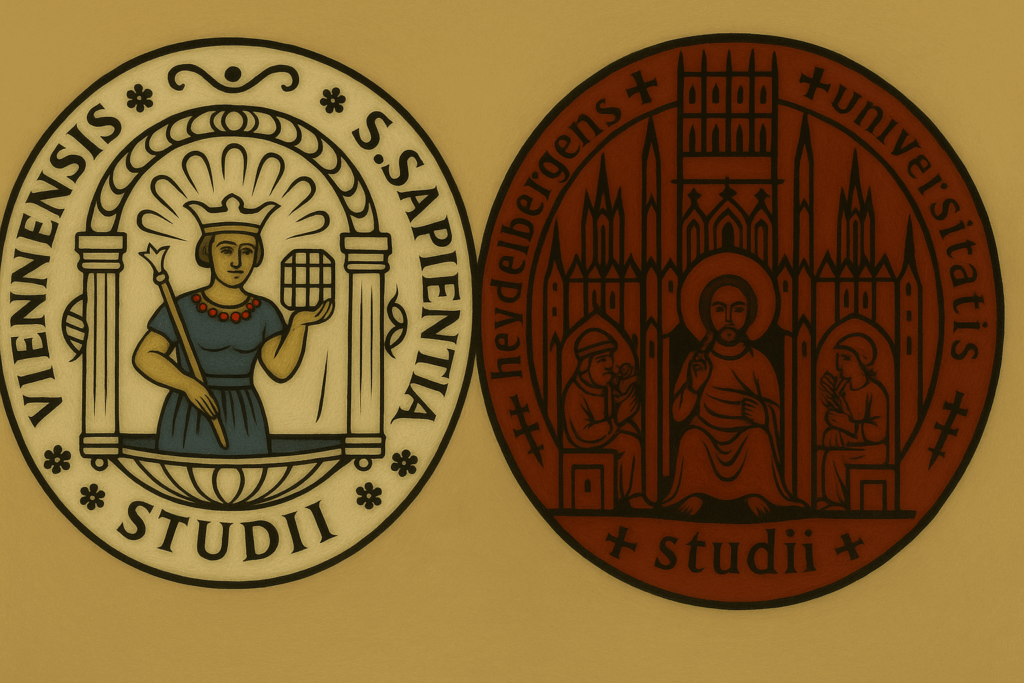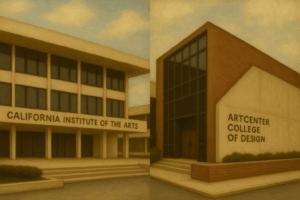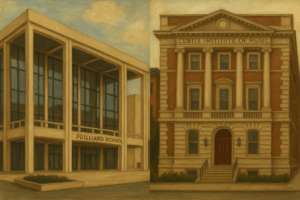
The GOAT of German-Speaking Universities?
In the heart of Europe stand two colossal academic pillars that have guided Western intellectual history for centuries: the University of Vienna in Austria and Heidelberg University in Germany. These institutions are more than just places of learning; they are living legacies, born from an imperial capital’s intellectual revolution and the birthplace of German Romanticism, respectively, and continue to exert a profound influence on global scholarship to this day.
This article, based on the latest 2025 information, goes beyond a superficial listing of rankings to provide an in-depth comparative analysis of the historical identities, latest global standings, key research areas, campus cultures, and the legacies of the world-changing alumni of these two universities. You will gain clear insight into whether the University of Vienna or Heidelberg University is the more suitable choice for your academic journey.
1. History and Tradition: The Paths of Two Intellectual Giants
Heidelberg University: The Cradle of German Romanticism and Scientific Innovation
Founded in 1386, Heidelberg is Germany’s oldest university. It is the historic site where Martin Luther held his disputation for the Reformation in 1518, and in the early 19th century, it became the center of the German Romanticism movement. Subsequently, with figures like chemist Robert Bunsen and physicist Gustav Kirchhoff making decisive contributions to the development of modern science, it emerged as a global center for natural science research.
University of Vienna: From the Heart of an Empire to the Cradle of Modern Philosophy
Founded in 1365 by the Habsburg dynasty, the University of Vienna is one of the oldest universities in the German-speaking world. It served as the intellectual center of a multinational empire, and in the early 20th century, it became the home of the ‘Vienna Circle,’ one of the most important movements in modern philosophical history.
The Vienna Circle was a group where the greatest minds of the era, such as Moritz Schlick, Rudolf Carnap, and Kurt Gödel, gathered to develop logical positivism. Their activities completely changed the course of 20th-century analytical philosophy and the philosophy of science.
2. Standing on the World Stage: An In-Depth Comparison of 2025 University Rankings
Analysis of Overall Rankings: QS, THE, and ARWU
In the three major global university rankings, Heidelberg University generally holds a higher position than the University of Vienna. It particularly shows strength in research-focused evaluations.
| Ranking System | Heidelberg University (Rank in Germany) | University of Vienna (Rank in Austria) |
|---|---|---|
| QS 2025 | 84th (3rd) | 137th (1st) |
| THE 2025 | 47th (3rd) | 110th (1st) |
| ARWU 2024 | 50th (1st-3rd) | 151-200th (1st-2nd) |
Competitiveness by Academic Field: What to Study, and Where?
- Arts & Humanities: Heidelberg shows depth in classics and history, while Vienna demonstrates strength in specific areas like Communication & Media Studies (ranked 15th in the world).
- Life Sciences & Medicine: Heidelberg holds a leading global position through collaborations with institutions like the German Cancer Research Center (DKFZ) (QS Medicine world rank: 32nd).
- Natural Sciences: Both universities maintain world-class standards in physics, chemistry, and mathematics, showing neck-and-neck competitiveness.
- Social Sciences & Management: Vienna has a slight edge in political science and sociology.
3. The Forefront of Research: Key Research Areas and Academic Ecosystems
Heidelberg: A Global Leader in Life Sciences and Physics
The most representative example symbolizing Heidelberg’s research power is its collaboration with the German Cancer Research Center (DKFZ). This partnership, known as the ‘DKFZ-ZMBH Alliance,’ is a driving force behind world-class research achievements, including joint faculty appointments and shared research facilities.
Additionally, four Max Planck Institutes, focusing on areas like astronomy and nuclear physics, are located in the city, forming a vast research network.
Vienna: An Intellectual Hub for Humanities, Social, and Quantum Sciences
Based on the historical depth accumulated as the capital of a multi-ethnic, multi-cultural empire, the University of Vienna has unique strengths in law, political science, history, and philosophy. Furthermore, it is at the global forefront of quantum science and basic sciences, being home to Professor Anton Zeilinger, the 2022 Nobel laureate in Physics.
4. Campus Life: The Harmony of Academic Environment and Urban Culture
Heidelberg: Where Historic Charm Meets Cutting-Edge Science
Heidelberg’s humanities and social sciences campus is located in the Old Town (Altstadt), a UNESCO World Heritage site, while its natural sciences and medical campus is in Neuenheimer Feld, a modern research complex. Students can experience both the romance of a classic university town and the environment of a modern research hub simultaneously.
Vienna: A University in the City with the World’s Best Quality of Life
The University of Vienna’s functions are integrated throughout the city. The city itself feels like a vast campus, and students step out of lecture halls directly into world-class museums, opera houses, and historic cafes. Vienna’s rich cultural assets, which make it consistently ranked as one of the most livable cities in the world, are a highly attractive factor for international students.
5. Great Legacies: Alumni Who Changed the World
Representative Alumni of Heidelberg University
| Field | Alumnus | Key Achievement & Legacy |
|---|---|---|
| Theology, Education | Philipp Melanchthon | Authored the Augsburg Confession, reformed the German public education system. |
| Philosophy | Georg W. F. Hegel | Authored Phenomenology of Spirit, completed German Idealism philosophy. |
| Chemistry | Robert Bunsen | Invented the Bunsen burner, co-founded spectral analysis with Kirchhoff. |
| Physics, Physiology | Hermann von Helmholtz | Formulated the law of conservation of energy, merged physiology and physics in his research. |
| Chemistry | Dmitri Mendeleev | Created the periodic table of elements. |
| Sociology | Max Weber | Authored The Protestant Ethic and the Spirit of Capitalism, a founder of modern sociology. |
| Philosophy, Psychiatry | Karl Jaspers | A key figure in existentialist philosophy, an intellectual who resisted totalitarianism. |
| Political Theory | Hannah Arendt | Authored The Origins of Totalitarianism, one of the most important political thinkers of the 20th century. |
| Virology | Harald zur Hausen | Identified the link between HPV and cervical cancer (Nobel Prize). |
| Physics | Stefan W. Hell | Developed super-resolved fluorescence microscopy (Nobel Prize). |
Representative Alumni of the University of Vienna
| Field | Alumnus | Key Achievement & Legacy |
|---|---|---|
| Humanities, Religion | Pope Pius II | A key figure who spread Renaissance humanism north of the Alps. |
| Genetics | Gregor Mendel | Discovered the laws of inheritance through his pea plant experiments, the ‘father of genetics’. |
| Psychoanalysis | Sigmund Freud | Founded psychoanalysis, explored the human unconscious mind. |
| Philosophy of Science | Karl Popper | Defined the boundary between science and non-science with the principle of ‘falsifiability’. |
| Literature | Stefan Zweig | One of the greatest writers of the 20th century, author of The World of Yesterday. |
| Physics | Erwin Schrödinger | Established the Schrödinger equation, a cornerstone of quantum mechanics (Nobel Prize). |
| Economics | Friedrich Hayek | A leading economist of the ‘Austrian School’ (Nobel Prize). |
| Nuclear Physics | Lise Meitner | A pioneering female scientist who first explained the phenomenon of nuclear fission. |
| Literature | Elfriede Jelinek | Known for works exposing social hypocrisy and power structures (Nobel Prize). |
| Physics | Anton Zeilinger | Succeeded in experiments on quantum entanglement and teleportation (Nobel Prize). |
Conclusion: In 2025, What is the Optimal Choice for You?
While both universities offer world-class education and research environments, there are clear differences in their character and strengths.
For Research-Focused Depth: Heidelberg
If you want to immerse yourself in a world-class research environment in specific scientific fields such as life sciences, medicine, or physics, Heidelberg University could be an excellent choice. Its organic collaborative relationship with institutions like the German Cancer Research Center provides a unique research ecosystem and is particularly attractive to researchers who wish to conduct in-depth studies in a structured environment.
For Broad Humanistic Insight and International Experience: Vienna
On the other hand, if you want to broaden your intellectual horizons in a wide range of fields such as humanities, social sciences, philosophy, and arts, and experience an international urban culture, the University of Vienna might be the better choice. The historical depth accumulated as an imperial capital and its tradition of critical intellectualism give it unique strengths in the humanities and social sciences, and the rich cultural assets of one of the world’s most livable cities will enrich your life.
Ultimately, the choice between the two universities requires careful consideration of your own academic goals, research style, and desired way of life.


